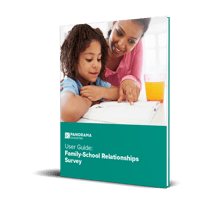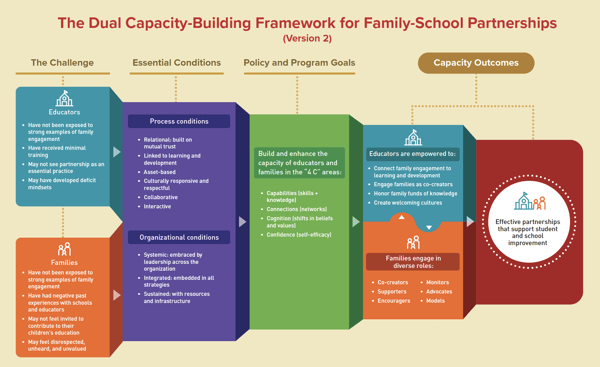School, Family, and Community Partnerships: Preparing Educators and Improving Schools Pdf
Parents are the experts on their children. Yet, commune leaders know that promoting family engagement is far from a simple endeavor. Educators and administrators play a big function in shaping family-schoolhouse partnerships. When schools drag families every bit true partners and the experts that they are, students benefit significantly. When districts back up families through thoughtful, equitable policies and programs, it encourages broader community engagement that tin can help to enrich educatee learning and optimize educatee success. Decades of research outline a clear need for parent involvement in a child's educational experience. When families are engaged in school, their children are more than likely to succeed. However, the research also shows that there are many common barriers to parental involvement. These barriers—such equally a lack of fourth dimension, childcare needs, and negative perceptions nearly school and staff—tin make it difficult for families to appoint in their children's education. There is no one-size-fits-all arroyo to family unit engagement. All the same, information technology's crucial to ensure families take a voice in their child's educational experience. Random acts of engagement are non enough; districts must look to systematically involve families across all course levels. This guide will equip y'all with the strategies and tools you lot need to meaningfully and continuously appoint families in their children'due south learning and development. By the end, you lot'll empathize common barriers to engaging families, equity-centered and engineering science-supported strategies for connecting with caregivers, and methods for enabling family engagement with survey data. Download Now: the Panorama Family unit-Schoolhouse Relationships Survey ane. What Is Family Date? 2. The Power of Parent Interest iii. Identifying Barriers to Family Date 4. Strategies for Supporting Family Engagement in Schools five. Family unit Date Resource Family unit date is the shared responsibility of family members, schools, and communities. District and school leaders ofttimes consider family engagement a two-fashion process that begins in early on childhood education, persists through loftier school, and occurs across multiple settings where children larn. Relational trust, mutual respect, and cultural responsiveness are pillars of systemic family engagement. The Global Family unit Inquiry Project, led by researchers at Harvard University, identifies systemic family engagement – that is, parent engagement that is integrated into schoolhouse structures and educator professional development – as a core component of educational goals, such as pupil achievement, school turnaround, and school readiness. Family engagement requires a commitment from schoolhouse leaders and educators to: To recognize the many different types of family configurations, researchers and youth-serving organizations tend to include parents also as other adult caregivers in the definition of "family." For example: many early childhood education centers describe family engagement as including biological, adoptive, and foster parents; grandparents; legal guardians and informal guardians; and adult siblings. Inquiry shows that involving families in their children's education is paramount to educatee success. When families are meaningfully and continuously engaged in their children's learning and development, it has a positive impact on their child's wellness, bookish, and well-being outcomes. Furthermore, numerous studies have shown that family involvement tin do good all students, especially those less likely to succeed in school. Nosotros know that engaging families is disquisitional for student success—in academics and social-emotional learning— besides as for the overall school climate. Now, let's discuss the barriers that can foreclose families from finer engaging with school. Many of these barriers – such as families perceiving schoolhouse staff as too busy to interact with them or that the school doesn't properly communicate opportunities to exist involved – are areas that administrators and teachers can improve when they understand the underlying obstacle or claiming. The post-obit factors are commonly cited in inquiry equally barriers preventing families from engaging in their child'due south educational experience: In order to improve collaborate with families, districts and schools need to better understand the needs, obstacles and challenges facing caregivers. Too oftentimes, educator perceptions of family engagement barriers practise not align with families' experiences. Conducting bi-annual, district-wide family surveys is one manner to collect robust data that can elevate family voices and experiences. By conducting a survey of your families, your schoolhouse or district can hear from a representative group of parents and guardians, rather than relying merely on the perspectives of parents who are already highly engaged in advisory committees or PTA groups. In aggregating our dataset of responses of over 18,000 parents and guardians from diverse school communities across the state, several themes emerged in terms of common barriers to appointment for families. The most common barrier to engagement is a lack of time, with 54 percent of parents and guardians reporting that their decorated schedule is a "medium" to "very large" problem for becoming involved in their child's schoolhouse. Other top barriers to engagement include: The work doesn't end once your district has identified the barriers or obstacles to family engagement. With survey data readily bachelor, family unit engagement coordinators and district leaders tin can take targeted steps to reduce these barriers through targeted strategies that build authentic family unit-school partnerships. A strong family engagement plan consists of thoughtful, culturally-responsive, and disinterestedness-centered strategies that are grounded in feedback from both caregivers and every bit educators. As one example of this framework in action, Baltimore Urban center Public Schools created a program that sent pre-kindergarten and kindergarten students home with numberless containing award-winning children's books and resources for parents on how to promote early babyhood literacy at home. Using family surveys, administrators can invite caregivers to document their perceptions of their child's experience in school. The information gathered tin can help districts better understand the experience of all caregivers, delve into potential disparities occurring on demographic and socioeconomic lines, and plant policy and programmatic changes accordingly. Families tin besides share whatsoever skills or contributions they would similar to offering to the schoolhouse community. School leaders tin can then provide families with volunteer opportunities to match those skills and interests. Successful family unit engagement programs are built on a foundation of joint decision-making and goal setting. Inviting families to take part in this work tin can increase caregiver appointment and reinforce that their involvement will have a direct touch on on their children'due south education and well-being. Some districts invite caregivers to be part of their decision-making procedure through specific councils or committees that are tasked with setting school policies or developing enrichment programs. Other districts create advisory committees composed of teachers, administrators, parents, and community leaders to solicit and provide input on educational initiatives and policy. Your district'southward family engagement initiatives must exist responsive to the attitudes, behaviors, and beliefs of all families. No thing a family'south race, ethnicity, culture, or socioeconomic condition, every family has both aspirations and concerns for their children's success. Families are the foundation from which teachers build their students' voice, agency, and academic development. Without this understanding, the virtually well-intentioned efforts can autumn short of establishing authentic partnership with families. In linguistically and culturally diverse communities, it is of particular importance for districts to recognize and honor the traditions and sacrifices of all families. Families of colour typically rely heavily on familial and social networks, including extended family members. Consider the following when evaluating your district's family unit appointment programs: Flexibility is cardinal. Not all parents have time to visit school in the heart of the day or to attend meetings on school nights. Although some parents may want to be involved in projects or committees, they may lack the time, resources, or social majuscule to engage. Hither are examples of ways to set upward flexible pathways for parental involvement. When schools offer flexible options for parents to get involved, and parents can commencement to see the positive benefit of investing in school initiatives, engagement efforts are far more likely to be successful. When implemented effectively, parental engagement strategies employ consequent, two-way, meaningful communication to ensure parents are viewed every bit full partners in their children'southward didactics and included (and truly heard) in decision-making processes that involve their schoolhouse's various education programs. Co-ordinate to a 2018 report on customs date, parents want timely and impactful communication from their child'southward school. They want to exist kept informed without feeling overwhelmed. Two-manner communication (correspondence that goes dorsum-and-along between parents and educators as equals) is crucial to conveying care and building trust. One-way communication (advice that just flows from the school to the dwelling) is inadequate for deeply attention to families' experiences, strengths, and needs. Districts need to allow for both school- and family- initiated communication that is timely and continuous, focuses on a kid's educational experience, and reflects each family's language preference. In the by decade, engineering-enabled family date has emerged equally a new option for schools. When assessing which tools or mediums are a all-time fit for your district'southward unique context (and your families' unique needs), consider some of our favorite options: This guide is just a starting betoken for exploring the topic of family unit date. Here are some resources to explore next: There are many other organizations and researchers that specialize in this area. Here are some articles and resources worth bookmarking: What is Family Appointment?
The Power of Parent Interest
Why is Family Engagement Important?
Identifying Barriers to Family unit Appointment
Common Barriers to Family Engagement
Measuring Family Date
 Panorama Education's Family-Schoolhouse Relationships Survey – adult in partnership with Dr. Karen Mapp and researchers at the Harvard Graduate School of Instruction – provides districts with a clear picture of family unit attitudes about a broad array of topics, including:
Panorama Education's Family-Schoolhouse Relationships Survey – adult in partnership with Dr. Karen Mapp and researchers at the Harvard Graduate School of Instruction – provides districts with a clear picture of family unit attitudes about a broad array of topics, including:
Strategies for Supporting Family Engagement in Schools
Ground your district's strategic planning in an show-based family engagement framework

Based on existing research and best practices, the Dual Chapters-Building Framework for Family-Schoolhouse Partnerships is designed to back up the development of family unit appointment strategies, policies, and programs. Developed past Dr. Karen Mapp and a squad of researchers at the Harvard Graduate School of Education, the framework provides the goals and "essential conditions" necessary for districts to nautical chart a path toward effective family unit engagement efforts that support student achievement and school comeback. Invite families to share priorities, concerns, and feedback
Bring families into the controlling procedure
Appraise all family unit engagement initiatives through an equity lens
Offer flexibility and a variety of options for family unit involvement
Leverage a variety of tools to facilitate meaningful, two-mode communication
Boosted Family unit Engagement Resources
Source: https://www.panoramaed.com/blog/family-engagement-comprehensive-guide
0 Response to "School, Family, and Community Partnerships: Preparing Educators and Improving Schools Pdf"
Post a Comment